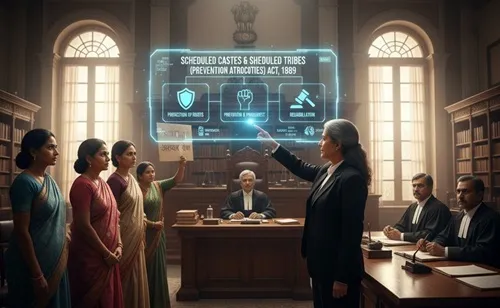
The Scheduled Castes and Scheduled Tribes (Prevention of Atrocities) Act, 1989, was enacted to protect individuals belonging to SC/ST communities from caste-based discrimination, violence, and exploitation. It mandates stringent punishments for offences committed against these communities and provides mechanisms for their protection and rehabilitation.
Key Features of the Act
- Definition of Atrocities: The Act defines various offences, including physical violence, verbal abuse, social boycott, and denial of access to public places, committed against SC/ST individuals.
- Punishments: Offenders can face imprisonment ranging from six months to life, depending on the severity of the offence.
- Anticipatory Bail: The Act disallows anticipatory bail for offences under its purview, ensuring that accused individuals cannot evade arrest before trial.
- Special Courts: Designated special courts are established to expedite the trial of cases under the Act.
- Protection and Rehabilitation: Victims are entitled to protection, legal aid, and compensation.
State-wise Statistics (2022):
| State | SC Atrocities Cases | ST Atrocities Cases |
|---|---|---|
| Uttar Pradesh | 12,287 | - |
| Rajasthan | 8,651 | - |
| Madhya Pradesh | 7,732 | - |
| Bihar | 5,000+ | - |
| Tamil Nadu | 3,041 | - |
| Odisha | - | 1,000+ |
| Jharkhand | - | 1,200+ |
| Chhattisgarh | - | 800+ |
Note: Data is based on available reports and may vary.
Reporting Mechanisms and Support
- Filing a Complaint: Victims or witnesses can file a First Information Report (FIR) at the nearest police station or approach the SC/ST Protection Cell in their state.
- National Helpdesk: The Ministry of Social Justice and Empowerment operates a National Helpdesk for the Prevention of Atrocities on SC/ST members. It provides assistance and guidance on legal processes and victim support.
- Compensation and Rehabilitation: Victims are entitled to compensation as per the guidelines issued by the National and State Commissions for SC/STs. Additionally, rehabilitation programmes are available to support victims in their recovery and reintegration.
FAQs – SC/ST (Prevention of Atrocities) Act, 1989
-
Q. What is the purpose of this Act?
-
A. To protect Scheduled Castes (SC) and Scheduled Tribes (ST) from caste-based violence, discrimination, and humiliation.
-
Q. Who is protected under this Act?
-
A. Only individuals officially recognised as Scheduled Caste or Scheduled Tribe by the government.
-
Q. What is an "atrocity"?
-
A. Any act like beating, abusing, insulting by caste name, forcing to eat waste, sexual assault, or preventing entry into public places.
-
Q. Who can be punished under this law?
-
A. Any person (usually from a non-SC/ST background) who commits a listed offence against SC/ST members.
-
Q. What is the punishment under this Act?
-
A. Imprisonment from 6 months to life, depending on the crime.
-
Q. Can the accused get anticipatory bail?
-
A. No. The law disallows anticipatory bail for offences under this Act.
-
Q. Is it only for physical violence?
-
A. No. It also covers verbal abuse, social boycott, discrimination, harassment, etc.
-
Q. What if the atrocity is committed by a government officer?
-
A. Public servants misusing power can also be punished under this Act.
-
Q. Are false complaints a problem under this Act?
-
A. Yes, sometimes. But the Supreme Court has allowed police to check the complaint before arrest.
-
Q. Can women file cases under this law?
-
A. Yes, SC/ST women facing caste-based sexual harassment or violence are protected.
-
Q. Are there special courts under this Act?
-
A. Yes, Special Courts are created for fast trials in these cases.
-
Q. What protection is given to victims?
-
A. Victims are given police protection, legal aid, and financial compensation.
-
Q. How can one file a case under this Act?
-
A. File an FIR at the nearest police station or approach the SC/ST Protection Cell.
-
Q. What happens if the police don’t register the complaint?
-
A. You can complain to higher officers, the District Collector, or the National/State SC/ST Commission.
-
Q. Is this Act applicable in rural areas only?
-
A. No, it is applicable all over India, both rural and urban.
-
Q. Can an SC/ST person also be punished under this Act?
-
A. No, this law is meant to protect SC/STs, not to act against them.
-
Q. What is a social boycott?
-
A. Refusing to interact, sell goods, or cooperate with someone due to their caste. This is punishable under the Act.
-
Q. Can this Act be used in workplace harassment?
-
A. Yes, if the harassment is caste-based.
-
Q. Does this Act apply to private disputes too?
-
A. Only if the offence is motivated by caste-based bias or discrimination.
-
Q. What if a victim belongs to a Scheduled Tribe in a Scheduled Area?
-
A. They are equally protected, and more attention is given in tribal regions for proper implementation.
Add new comment